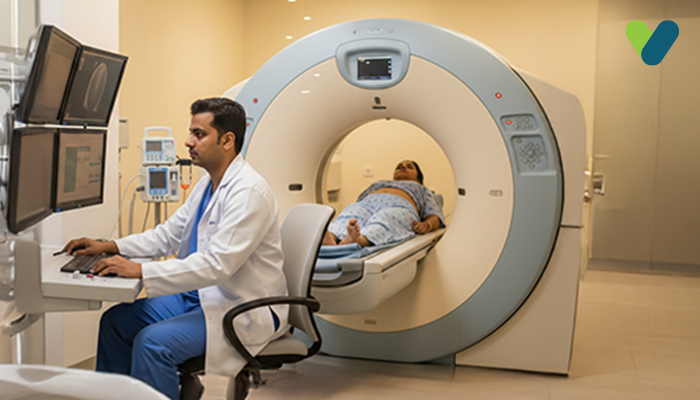A CT scan of the brain is a non-invasive diagnostic imaging process that creates axial or horizontal images of the brain, often known as slices, by using specific X-ray measurements. Compared with ordinary head X-rays, brain CT scans can offer highly precise details about the brain's tissue and structural makeup, thereby providing additional information about any injuries to or disorders of the brain. You can find the advantages, dangers, and processes of a brain CT scan on this page.
Benefits of a Brain CT Scan
The brain tissue and other structures in the head and neck are clearly and precisely provided with brain CT scans. This information can be utilised to identify medical issues and develop effective treatment plans. When it comes to identifying brain bleeding and oedema, which can be fatal if untreated, CT scans are very helpful. Brain CT scans can also be used to:- Detect tumours and other abnormalities in the brain tissue
- Evaluate the extent of head and neck injuries
- Guide procedures such as biopsies and surgeries
- Monitor the progression of medical conditions over time
Risks of Brain CT Scans
CT brain scans involve exposure to ionising radiation, which can increase the risk of various cancers over time. A single CT scan only exposes you to a little quantity of radiation, but repeated exposure can raise your risk of developing cancer. The advantages of a brain CT scan typically exceed the hazards, particularly when a medical issue needs to be identified or tracked.In most cases, medical professionals advise against having a CT scan while you are pregnant. A doctor can give guidance on whether the advantages outweigh the dangers, albeit one CT scan is unlikely to pose a major risk.
Another risk of CT scan for the head is an allergic reaction to the contrast material like dye. It is a substance that is injected into a vein to make the blood vessels and other structures in the head and neck clearly visible on the scan. Allergic reactions to contrast material are rare, but they can be serious. The symptoms of such allergic reactions can include a heated sensation all over the body or a metallic taste on the tongue. Sometimes a doctor will recommend taking a steroid or Benadryl (diphenhydramine) before getting a scan. Before the surgery, patients with allergies or a history of kidney illness should let their doctor know.
Things to Know Before A Brain CT Scan
The patient might need to take off any jewellery or spectacles that are made of metal and change into a hospital gown prior to the operation. The patient may also need to fast for a few hours before the scan if contrast material is used. The scan itself usually takes only a few minutes, during which the patient will lie still on a table that slides into the CT scanner. If contrast material is used, a trained professional injects it into a vein in the arm before the scan. Some people may experience a metallic taste in their mouth after receiving the injection.After the scan, the healthcare provider will review the images and provide a diagnosis recommend further testing or treatment as needed.
How to Prepare for a Brain CT Scan?
The healthcare professional will give detailed information on how to get ready for the scan before the procedure. To produce accurate and legible images, it is crucial to carefully follow these directions. Here are some general principles:- Inform your healthcare provider about any allergies or medical conditions, such as kidney diseases or pregnancy.
- Avoid eating or drinking anything for a few hours before the scan if the contrast material has to be used.
- Remove all kinds of metal objects, like jewellery, dentures, or hairpins.
- Wear loose, comfortable clothing without metal buttons or zippers.
- You should let your doctor know about any medication and herbal supplements you are taking.
What to Expect During a Brain CT Scan?
The brain CT scan procedure is straightforward and typically takes around 30 minutes to complete, including preparation time. Here are the general steps involved in the procedure:- You will be asked to lie down on a table that slides into the CT scanner. The healthcare provider will make sure you are comfortable and positioned correctly.
- If contrast material is needed, it will be injected into a vein in your arm. You may feel a brief sensation of warmth or a metallic taste in your mouth after receiving the injection.
- The in-depth cross-sectional images of your brain tissue and the other structures of your head and neck are captured by a succession of X-rays that the CT scanner releases.
- The doctor may suggest you to hold your breath for a brief period of time throughout the scan in order to minimise movement and enhance the image quality.
After the Brain CT Scan: Next Steps and Follow-Up Care
After the scan, you can resume normal activities immediately. However, if the contrast material is used for the scan, your healthcare provider may recommend that you drink plenty of fluids to help flush it out of your system. As appropriate, your healthcare professional will suggest additional tests or treatment after reviewing the photos and making a diagnosis.After the surgery, call your doctor right away if you are suffering from any kind of strange symptoms, such as rashes or trouble breathing. These reactions are quite rare, but they can take serious turns.

